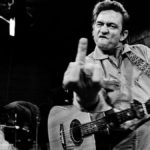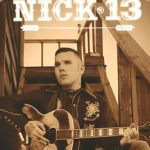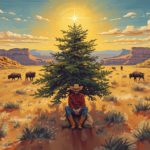A pink-cheeked bumpkin who turned into a grizzly bear, William Orville Frizell was born in 1928, on March 31. The world immediately seemed to him like a kind of lair where you can have a great frolic. My dad, an oilman, was processing cranes in north Texas. Those “cranes” are still nodding, by the way. The eldest son, among the other seven, was called Sonny.. Therefore, William Orville very soon achieved the right to be called Lefty, beating the neighbor’s uncle with one left hand. Working in the oil fields was simply boring, and the bearish soul demanded, well, Jimmy Rogers records did not give rest. Lefty Frizell began performing in the surrounding pubs, simultaneously performing his songs on KPLT radio in Paris, Texas, of course. There he met his destiny, the she-bear Alice Harper. Lefty and Alice got married in March 1945, without waiting for the surrender of Nazi Germany and the Mikado Empire.

The trouble came exactly from where it was worth waiting for: nineteen-year-old Lefty Frizell, who had lost his temper, trampled on a grateful chick who was under eighteen at the time (Winoni Harris wittily talks about similar situations in the song “Good Morning Judge”). Six months in prison gave me time to think and reflect: Frizell wrote a huge amount of poetry for his wife, although, of course, they were flavored with a prison postmark, they only reminded me of ridiculous adultery. In 1949 Lefty stopped playing music. After being released, he went to conquer the bowels of the earth with his father…
But that wasn’t it! In 1950, Lefty Frizell cut off his tails, starting a full-fledged musical career. The owner of Ace Of Clubs, Jim Beck, notices Frizell immediately. Contrary to the garters in the “big” show business, Beck fails to “sell” Lefty until the demo tape reaches the legendary Don Lowe. Don has great musicians on hand. Lefty’s first single hit the listener with both sides: “If You’ve Got The Money (I’ve Got The Time)” – hillbilly with swing skids and witty lyrics; “I Love You A Thousand Ways” Frizell also wrote to his wife while in jail. It is interesting for the piano part, where the pianist definitely plays boogie with his right hand. Great syncopation. This single sent Lefty straight to the top of show business, which no one north of the Mason-Dixon line cared about. But in the agrarian South, shows like the Grand Ole Opry and Louisiana Hayride not only gathered hundreds of country music fans for each concert, but were also played on the radio in any family, not necessarily white.

By 1952, Lefty Frizell had thirteen songs in the Country top 10, and at one point four at once, which became a record of his time. In addition, he turned out to be the only performer able to compete in popularity with Hank Williams, which led to two large joint tours in 1951-52. Before the next performance, Hank and Lefty tossed a coin, deciding who would go on stage first, and after the show they did tricks that Frizell never told them about, and it was probably they who brought Williams to zugunder on New Year’s Eve on January 1st, 1953. But even with Lefty, these wild drinking sessions have played a cruel joke: his new singles are less and less capturing the attention of the audience: despite the fact that his performing skills have grown by an order of magnitude, the songs have lost their nerve and wit. And Hank’s death had an effect, for sure…
And in 1954, rock and roll broke out. Jump blues and New Orleans rhythm and blues had long been playing on Black radio stations, but suddenly 29-year-old Bill Haley, who had previously played such a rollicking version of country music as Western swing, became interested in “colored” music since 1953, recording “Crazy Man Crazy” and “Shake Rattle And Roll”. And later, after listening to the song “Rock Around The Clock” performed by Italian-Americans Sonny Dae & His Knights, Bill recorded his own version, which broke through the charts. And this could be considered a detail, but in the same year, a certain young man with the strange name Elvis Presley performed an original interpretation of country and blues material on Louisiana Hayride, changing the face of southern music, for starters …

Lefty originally had a cheerful, slightly nasal, slightly cracked timbre, while masterfully mastering yodeling. The guys from the South were initially attracted by his singing style. But the market has already dictated its own rules, many country stars have switched to a new sound. The manager persuaded Lefty only in 1958, when Elvis was drafted into the army and there was no one to joke. “Cigarettes And Coffee Blues” is a shuffle with a great piano part, almost rockabilly, a bit clunky, but Frizell’s voice is unrecognizable. The ease of serving and the characteristic yodeling disappeared. The situation is no better with “You’re Humbuggin’ Me”: the musicians are having a blast, the saxophonist is blowing boogie, as if his lungs are being helped by gills, but Lefty’s vocals remain sad, he is the only one there who is not celebrating.
Lefty Frizzell – You’re Humbuggin’ Me
A new success came from nowhere: the ballad “Long Black Veil”, composed by Danny Dill and Maryjon Wilkins, was a dark anthem in the genre of southern Gothic. In 1959 Lefty Frizell reached the sixth step in the country hit parade with this macabre piece. Ten years later, Johnny Cash will perform this song, after which it will become a landmark, but many will still think that it was Cash who wrote about the “black veil”.

In his last number 1 hit, Lefty finally switched to a plush baritone, abandoning the tricks with a yodeling vocalization. Perhaps it was the most mature of his hits, although not so incendiary. And Frizell approached him only in 1964. Throughout the 1950s, our hero released only three big records. In the sixties, he improved, although sometimes re-singing his own songs doesn’t count.
In 1972, Don Lowe retired, after which the Columbia label cynically kicked Lefty Frizella out of its artists. Lefty spent the next three years recording and publishing on ABC.
Lefty Frizell was not just a singer and songwriter, he had a huge influence on many musicians of subsequent generations, be it Roy Orbison, Merle Haggard, Willie Nelson and more. Lefty died on July 19th, 1975. Let’s wish him a good night, Moon Dogs!













